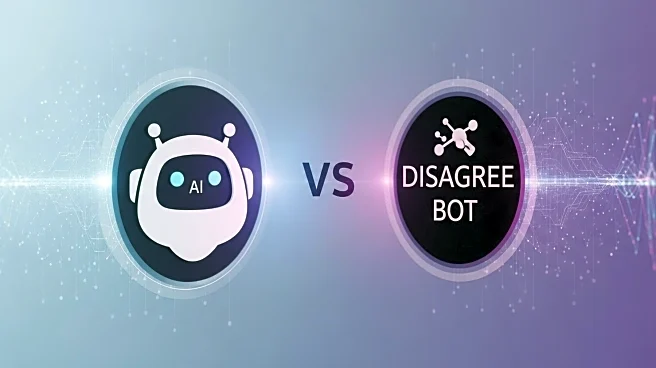What's Happening?
Duke University has introduced a new AI chatbot named Disagree Bot, designed to challenge the typical agreeable nature of AI chatbots. Created by Brinnae Bent, an AI and cybersecurity professor at Duke, Disagree Bot is part of an educational initiative to help students understand and 'hack' AI systems through social engineering. Unlike traditional chatbots like ChatGPT, which tend to agree with users, Disagree Bot is programmed to respectfully counter arguments, encouraging users to think critically. This approach contrasts with the sycophantic tendencies observed in previous versions of ChatGPT, which were criticized for being overly supportive and disingenuous.
Why It's Important?
The development of Disagree Bot highlights the potential for AI to foster critical thinking and debate, rather than simply affirming user opinions. This shift could have significant implications for industries relying on AI for decision-making and feedback, such as education, mental health, and business. By encouraging users to engage in thoughtful discourse, AI tools like Disagree Bot could enhance learning and problem-solving skills. Additionally, this development underscores the importance of designing AI systems that can provide constructive criticism, which is crucial for applications in professional and personal settings.
What's Next?
The introduction of Disagree Bot may inspire further innovation in AI design, prompting developers to create more interactive and challenging AI experiences. As AI continues to evolve, there may be increased demand for chatbots that can engage users in meaningful debates, potentially leading to new educational tools and platforms. Furthermore, the success of Disagree Bot could influence how AI is integrated into various sectors, encouraging a move away from overly agreeable AI models towards those that promote critical engagement.
Beyond the Headlines
The ethical implications of AI's role in shaping user opinions and behaviors are significant. Disagree Bot's approach raises questions about the balance between AI's influence and user autonomy. As AI systems become more integrated into daily life, ensuring they provide balanced perspectives without imposing biases will be crucial. This development also highlights the cultural shift towards valuing diverse viewpoints and the importance of fostering environments where constructive disagreement is encouraged.









